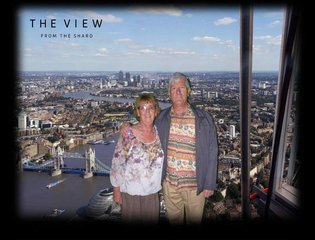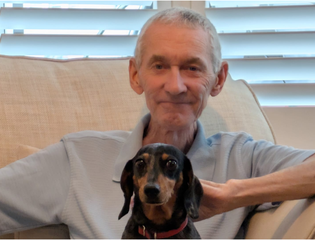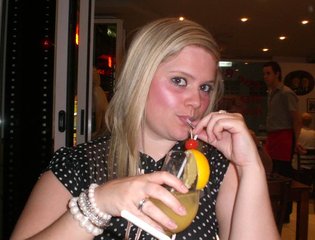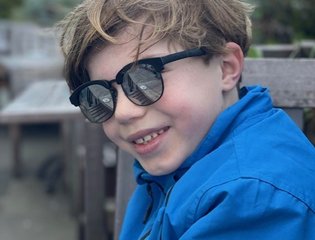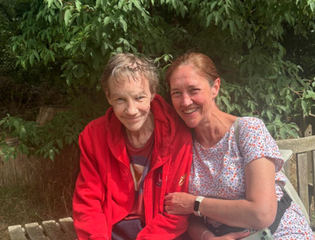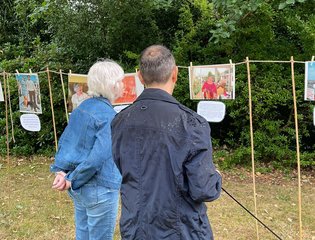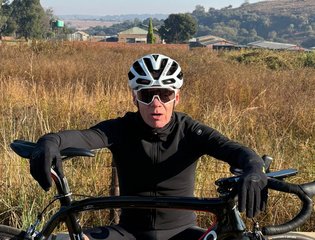Anushka and her two sons, Aidan, 9, and Arun, 7, from Sidcup, were supported by the hospice in 2024 as Anushka’s husband and the boys’ dad, Mike, died at home in July, just days after his 58th birthday.
As we sat in Anushka’s kitchen and spoke about her experiences over a cup of coffee, it was impossible not to be moved; she’s someone that demonstrates such strength as well as openness. Here she tells us about how the hospice was able to support the whole family including help around telling her children their daddy was dying, and how she wishes that talking about dying was less of a taboo, as people
talking about what was happening has been a big help. We also talk all about Mike, who by all accounts was quite the character. He was a man that valued family above all else - and manners, as is clear in their incredibly warm, friendly and polite boys – which Anushka tells us is testament to him.
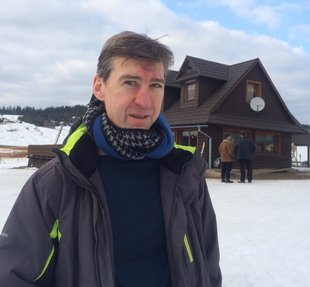
MY HUSBAND, MIKE
Mike was a real gentleman – he’d always do things like hold doors open and carry bags. He was a great dad too and loved his boys. In fact, one of the things that I thought was so special about him when we first met was how he talked about
his first son, my stepson, Martin.
Martin was his whole world. This was shown during his cancer and treatment too. It was 2009 when chemo and radiotherapy, having the treatment again when it came
back two years later. Years later the consequences of radical treatment meant he would gradually lose his functions; eventually not being able to speak, walk, eat or breathe without a breathing tube and 24 hour ventilation. Through the continued loss of abilities he fought and persevered because he wanted to be there for Martin and later for Aidan and Arun too. But it felt like the cancer was always there, just behind you, and you learn to live with the fear. And you do, for love. I just loved him. It was January 2024, after two years of being in hospital and doctors scratching their heads about what to do, when we were told that Mike’s condition was terminal.
Mike never accepted his prognosis; he was courageous, brave and dedicated to his family. He was also a very funny man; he made me laugh so much. Even from his hospital bed!
OUR FAMILY
I had to be strong for my husband and for my kids. But I was so desperate and so lost and I didn’t have the capacity to deal with grief.
Every time Mike lost a function I had to boost his morale and I couldn’t stop and think about me. That’s where the hospice came in.
Tracey (who works in the hospice’s social work team) spent hours with me, and asked things like ‘are you ok?’ People get really focused on the person that’s dying and you feel guilty for thinking about yourself.
We were under so much strain as a family and I put myself at the bottom of the heap to look after everyone. I was firefighting every day because his care was so
complex. The family has to take on the burden of the person dying and you do it because you love them. It’s also a time where you need help. But when someone is
dying, or has died, people don’t always know how to talk to you; sometimes they’ll even cross the road. They give you privacy at a time when you need people. I felt
like an alien, going through such a crisis - it just didn’t feel real. It also felt difficult to reach out to people.
How do you address the elephant in the room without bringing yourself down every time you talk about it?
I really think as a society we need to be talking about dying and not pretending it doesn’t happen.”
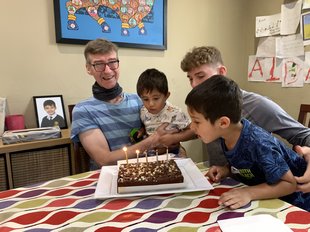
THE SUPPORT OF COMMUNITY HOSPICE
I don’t know how anyone would care for someone at home without the hospice. There was no way I could have done it without them. Everyone was so kind, so understanding and so compassionate and it felt so different to being in hospital. It
was such a relief, and a much more comfortable environment. Calling the team at the hospice was like a hug over the phone. It was moral support and knowing that I could just ring at any time was lifesaving. It was such a comfort.
The hospice took some of the work off me. They would contact the GP and arrange everything with the district nurses which meant I got to spend more time with Mike. They recognised changes in Mike and told me to enjoy the moments we had
together. It was really hard to hear but so important to know, especially with and for the children.”
TELLING THE KIDS
I knew I had to talk to the kids but you want to protect them. But, you can’t avoid the inevitable. The hospice team advised me to be open and honest. They explained
that kids don’t see things the way we as adults do; they don’t respond and react like us– instead they dip in and out. I found comfort in knowing that I wasn’t traumatising my kids by being honest with them.
And so, if they asked me questions, I’d tell the truth in the kindest way possible.
AnushkaThe boys would squeeze his hand. Aidan sat in Mike’s bed and watched a John Wayne film with him which is a really special memory. They became caregivers too; I have a photo of Arun looking at his dad, checking if he’s ok. It made me feel incredibly proud but also sad that they had to go through this. Arun is so young he may not have many memories of his dad. It was heartbreaking watching them saying goodbye.”
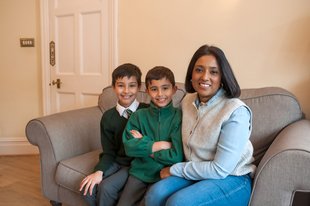
MIKE’S DEATH
Because of the hospice we were able to ensure Mike passed away at home. It was something that my mother had wished for, but we had not been able to achieve. This became a regret after she died and I really wanted to make sure that Mike had a different experience.
We were able to do this because of the hospice and their support. When the end came, Martin, my sister-in-law Mary, Dr Tajkea and our carers were there. His last moments were peaceful and surrounded by people who loved him and he loved. It was a beautiful experience and there is such comfort knowing that Mike had the best possible ending. His death was a milestone, just like marriage. We want to celebrate his life.
MY ADVICE FOR OTHERS
Don’t hesitate to ask for help from anyone, anywhere. Don’t hesitate to seek help from the hospice. They will help you and everyone in your family that’s affected. The hospice will help you survive; they will hold your hand, give you comfort, and they understand, so can advise you. Whatever you’re feeling, they will give you peace to help you get through each day.
The hospice gives you moments to let you carry on living life after.
THE FUTURE
am now learning now how to do things I wasn’t able to do because I spent so many years looking after others. I’ve joined the gym and am doing Pilates classes. I feel like I’m coming through a black tunnel.
When you go through something like this, it makes you see life in a different way and I’m conscious that it’s so easy to get caught up in the day to day. I want to be
sure of the choices I make and not let this experience be forgotten, I don’t want to let it be wasted.
Life doesn’t have to be this thing that we endure; if we want the possibility of good things, we have to take risks. So whatever we do now it’s because it’s fulfilling, we’re creating memories. Two weeks after the funeral we went to the Maldives.
It was a very special holiday. We thought of Mike and of making the most of life and of not caring about what others think. Life isn’t there to be endured. Ultimately, if my children are happy, then I am happy.

